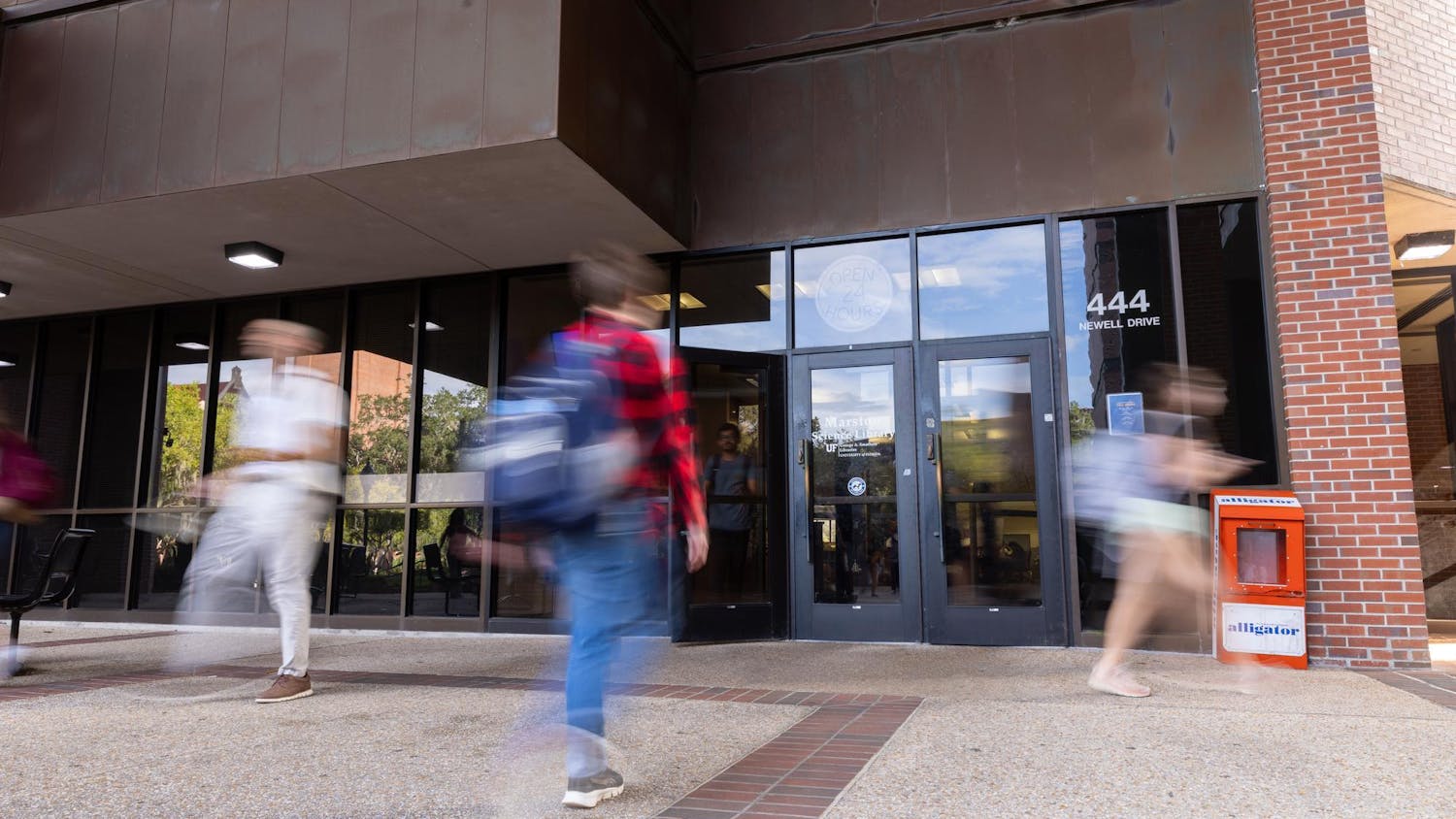Growing up in Gainesville, Michael Tudeen watched his two fathers face discrimination — bigotry that often spilled over into his life as a young boy.
Now, Dr. Tudeen combats health disparities in the LGBTQ community through UF Health.
“As part of my background, I feel a lot of calling to help out within the LGBT community,” he said. “Amongst that community, some of the people facing some of the biggest attacks are those in the transgender community.”
In honor of Pride Month, UF Health hosted a webinar about transgender health Tuesday. With 121 attendees, Dr. Tudeen, physician and assistant professor at UF Health Family Medicine Main Street Clinic, and Dr. Sarah Virk, plastic surgeon and assistant professor in the UF Department of Surgery, spoke about transgender issues, hormone therapy, surgical procedures and more during an informative presentation and Q&A.
Within his clinical practice, Dr. Tudeen noted health disparities with higher rates of depression, anxiety, PTSD, drug abuse, HIV infections and suicide attempts for transgender people. These disparities are especially heightened for people of color.
“These are astronomical numbers of people facing an incredible amount of pressure from society,” he said.
Half of transgender people say they have had to educate their doctor about their healthcare condition, while a third say they have had a negative experience with a healthcare provider after being judged or refused treatment, Dr. Tudeen said.
A quarter of transgender people say they have not sought care for a medical illness because they’re worried about having a negative experience.
“That’s something that we’re trying to combat here at UF Health,” he said.
Historically, patients assessed for gender dysphoria would be sent to psychiatrists or psychologists, he said, under the assumption they must be mentally unfit.
Gender dysphoria, currently diagnosed as a psychiatric condition under the DSM-V, will be replaced by gender incongruence in the ICD-11 — a less abrasive, psychiatric term, he said.
While some people are proud and vocal about their trans experience, other patients prefer not to be identified as transgender. As they live as their preferred gender, it's important to respect that and not share that information with others, he said.
With the rise in gender-nonconforming and transgender identification, UF Health is expanding the number of prescribers to meet the demand, especially for backlogged hormone therapy.
UF Health is working with the psychology and psychiatry departments to expand access for the unique needs of individuals, as well as offering voice coaching therapy. By reaching out to local community groups, UF Health hopes to build up partnerships.
Dr. Virk discussed the plastic surgery procedures she offers to patients, like transgender confirmation surgery, which aims to mitigate dysphoria by matching outward sexual characteristics with the patient’s identity inside. She said it results in gender congruency so they can live their most fulfilled lives like their cisgendered counterparts.
Dr. Virk provided information and informative graphics on genital and chest reconstruction, including vaginoplasty, phalloplasty, breast augmentation and mastectomy.
“It’s such a pleasure to take care of these patients and it gives me so much joy because you can really see how impactful it is,” she said.
About 96% of patients were very satisfied with a substantial reduction in dysphoria and improvements to quality of life. Dr. Virk’s biggest concern is post-surgical regret, which is estimated to be between 1-2% of patients.
“It’s a small number,” she said. “But it’s definitely real.”
The irreversible surgeries are taken seriously through diligent screening, selection criteria and counseling, she said.
She said she usually doesn’t have issues with procedures being covered by insurance in Florida. If coverage is denied, she does a peer-to-peer appeal.
“Which is me fighting with the insurance companies until I win,” she said.
UF does not currently have a reconstructive urologist to aid with “bottom” surgery, or genital reconstruction, so those are not offered at this moment, she said. But, she hopes to be able to offer them in the near future.
The UF Student Health Care Center cares for over 100 transgender patients, Dr. Ann M. Grooms, clinical professor in Community Health and Family Medicine at the UF Student Health Care Center, said.
“We can get everything done for the student at the Student Health Care Center,” Dr. Grooms said. “And anything that they need that we don’t do in our building, we will help them get that.”
The visits are free of charge and patients can go as often as they need. Costs apply to baseline lab work that will then be repeated every three months, which she said insurance generally covers. If patients find insurance doesn’t cover something, the pharmacy and nurses will help them find another pharmacy with the best price.
The center follows World Professional Association for Transgender Health (WPATH) guidelines that establish standards of care.
“For me, being able to take care of transgender patients has been some of the most rewarding parts of my medical practice — ever,” she said.
As soon as patients enter through the doors of the center, an emphasis on privacy, preferred pronouns and names begins from the moment they speak with secretaries.
Dr. Grooms said the center aims to provide patients with everything they need — ranging from hormone therapy, pharmaceutical and laboratory needs, to general and preventative care, including managing anxiety and depression. For surgeries, the center helps connect patients with resources.
“We want to help you be who you are,” she said.
The highest cost comes with surgery and many patients under the age of 26 prioritize it before being removed from family insurance plans.
With most patients between 18 and 30 years old, many have never experienced or sought care due to lack of family support, lack of access or distance barriers. One patient resorted to black market testosterone for nine years, Dr. Grooms said.
“We don’t let anybody not have access to care,” she said.
People are healthier when they are able to come out and get therapy that supports who they are, she said.
“Be who they are, be proud of who they are, and search out any help and therapy they feel they need or want,” Dr. Grooms said. “Because it’s there.”
Resources:
-
Rainbow Room: The Rainbow Room lounge provides group meetings and therapies through the Counseling and Wellness Center, which Dr. Grooms said is a great resource for students to just drop in and add their names to the email list. By being in groups, people can come to powerful realizations. “I’m not crazy. I’m not different.” Dr. Grooms said. “I’m just I. I am who I am. I want to be who I am.”
Location: 407 Peabody Hall
Gender-Inclusive Restroom Map: Created by the LGBTQ+ Affairs, the map shows which buildings have gender-inclusive and gendered single-stall restrooms on campus, including ADA accessibility. Dr. Grooms said there ought to be a universal bathroom in every building, but that doesn’t exist. Awareness of the issue has increased, but construction approval complications slow the progress down.
-
TranQuility: With a mission to improve the quality of life for transgender and gender non-conforming individuals, TranQuility fosters connections between trans people and provides education on allyship.
Location: HealthStreet on 2401 SW Archer Road, Gainesville, FL
Contact: alachuatranquility@gmail.com
-
Youth Gender Program: Following children until adolescence, the program manages the healthcare and psychological concerns of both the parents and child, Dr. Grooms said. While some patients will go on to puberty blockers in adolescence, others do not go on to identify as transgender later in life. Through a team of pediatric endocrinologists, psychologists and psychiatrists, services include consultation, psychotherapy and assessment of medical readiness for cross-sex hormone therapy.
Location: UF Pediatrics Access Center, 1699 SW 16th Ave. Building Suite A, Gainesville, FL 32608
Contact: (352) 265-7337 or peds-administration-ref-info@peds.ufl.edu
-
Student Legal Services: SLS offers free guidance for name and gender changes on official documents like driver’s licenses, passports and social security. The legal changes require a letter from a licensed physician, which Dr. Grooms said is available through the health center.
Location: Level 3 of the J. Wayne Reitz Union in Suite 3500
Contact: (352) 392-5297 or sls@ufsa.ufl.edu
Time: Office: Monday-Friday, 8 a.m.-5 p.m. By appointment only.
-
Get Yourself Tested (GYT) Clinic: For $15, patients can receive confidential twice-a-year testing for HIV, syphilis, chlamydia and gonorrhea. Dr. Grooms said the service is essential for people who have switched partners.
Location: Room 101 in the Infirmary Building, 280 Fletcher Drive, Gainesville, FL 32611
Contact: (352) 294-7582
-
PrEP: The UF Student Health Care Center provides resources for preventative HIV drugs like PrEP, or pre-exposure prophylaxis. Sold under the brand name Truvada, the pill can be costly, Dr. Grooms said. The health center can help patients find coupons to significantly reduce the cost, or go through the health department and receive the medication for free. “The cost should not be a deterrent,” Dr. Grooms said. “We will get it.” She said people need to recognize if they don’t want HIV, there are ways to prevent it. In addition to PrEP, the center helps with other preventive measures.
Location: Infirmary Building at 280 Fletcher Drive, Gainesville, FL 32611
Contact: (352) 392-1161
-
UF Equal Access Clinic: Access to HIV pre-exposure prophylaxis (PrEP) is provided at no cost through a patient assistance program. Dr. Grooms said this student-run service is a great resource for people seeking free access to PrEP. STI screening, rapid HIV testing, Pap tests and general medical care are available.
Location: 410 NE Waldo Road, Gainesville, FL 32641
Time: Clinic is held on the third Tuesday of every month starting at 5:30 p.m. at the Eastside Clinic
Contact: (352) 273-9425 for appointments or walk-ins before 6:30 p.m.
-
Unspoken Treasure Society: Dr. Tudeen partners with the Unspoken Treasure Society to work with East Gainesville to reduce health disparities in trans care, especially for people of color. The non-profit organization provides literature, support counseling and access to additional resources. The organization’s vision includes equal opportunities in job placements, affordable and fair housing, safe same-sex education, HIV testing and counseling, suicide prevention and advocation for victims of domestic abuse.
Location: 1001 NE 16th Ave. Suite 8 Gainesville, FL 32601
Contact: (352) 377-0384 or unspokensociety18@outlook.com
Contact Alexandra Harris at aharris@alligator.org. Follow her on Twitter @harris_alex_m.

Alexandra is a senior journalism major reporting on Science/Environment for The Alligator. Her work has appeared in The Gainesville Sun, and she filed public records requests for the Why Don't We Know investigative podcast. She has a passion for the environment.






